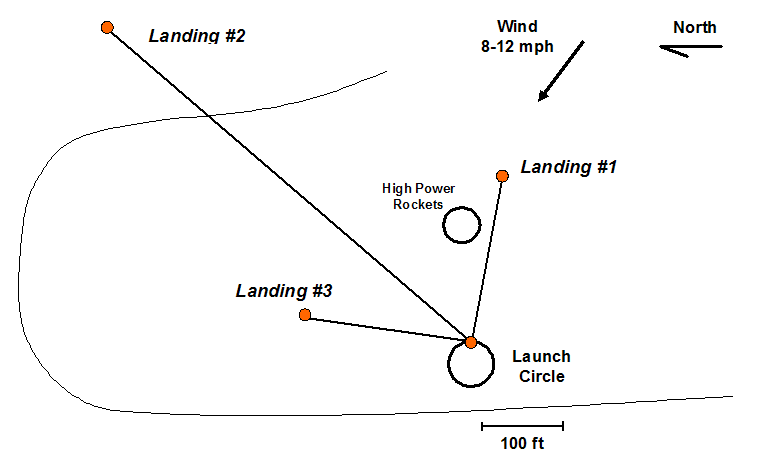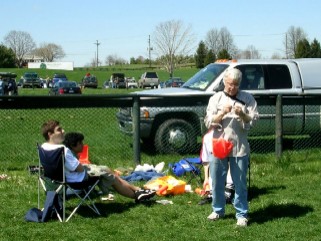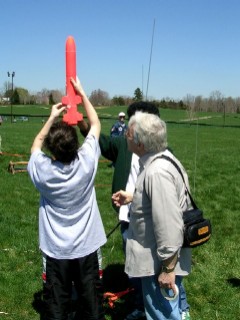 Ah, the smell of
black powder - qualification day arrived at Great Meadows, Virginia. We were
ready to do our TARC qualification launches. But we had a few problems
and ended up with scrambled eggs. The good news is we had all engines
ignite as planned. The bad news was with the parachutes and their
connections to the upper stages.
Ah, the smell of
black powder - qualification day arrived at Great Meadows, Virginia. We were
ready to do our TARC qualification launches. But we had a few problems
and ended up with scrambled eggs. The good news is we had all engines
ignite as planned. The bad news was with the parachutes and their
connections to the upper stages.Getting set up for the test lunch took a long time. We swapped out the launch rod with our own because it was a bit narrower. The test launch went off OK, but the parachute cords were burned and the upper stages came down without a chute. The eggs survived.
We decided to go for a qualification launch with the same rocket. We changed out the eggs to be sure we had good ones and used a new 18 inch parachute. We also went from C11s to D12s in the booster. The launch and staging went fine, but the parachute separated from the cargo container and the sustainer. All three came down separately. The eggs didn't make it.
We had one more try at qualification. We change sustainer and booster, used new eggs, and connected up the 18 inch chute. We had trouble at the launch rail -- the launch lug became loose. We retreated to the preparation area, wired on the launch lug and returned to the launch rail. The launch started OK, but the rocket went horizontal at staging and never had a chance.
In the end, we learned a lot and are now ready for next year.
| Video | Cargo #1 Sustainer #1 Booster #3 |
E9-4 2 C11-0 Estes 24" Chute |
All engines ignited | A little corkscrew, parachute cords burned off | Free fall of cargo with sustainer, eggs survived |
| Video | Cargo #1 Sustainer #1 Booster #3 |
E9-4 2 D12-0 18" Chute |
All engines ignited | A little corkscrew, shock cord broke off | Free fall of cargo and sustainer, eggs didn't survive |
| Video | Cargo #2 Sustainer #2 Booster #2 |
E9-4 2 D12-0 18" Chute |
All engines ignited | Turned horizontal at booster release, nosed into ground | Chute released on ground, eggs didn't survive |
Launch Site Map

 Lessons
Lessons1. We need a burn and tear resistance shock cord and parachute. While we used a plug with wadding to protect the chute area, we need more protection.
2. We used an aluminum foil cone around base of the sustainer engine to bring the sparks from the booster stage to the engine. This seemed to work well.
3. The launch lugs didn't work well. One came loose. We need to secure the lugs to the frame of the sustainer. We might use one at the top and one at the bottom of the sustainer to get more stability and a smoother launch on the launch rail.
4. We need to focus on recovering resources. We lost one parachute, one nose cone, a round file, and lots of wadding.
Hurry up Mr Ekman. |
Loading on the launch rail |
 Checking
the load. Checking
the load. |
Waiting for launch. |